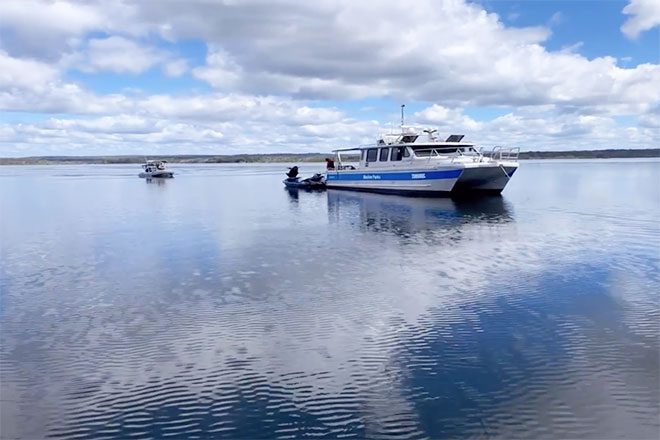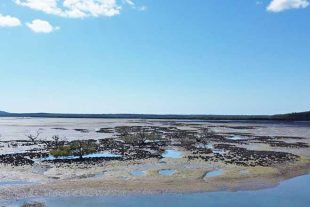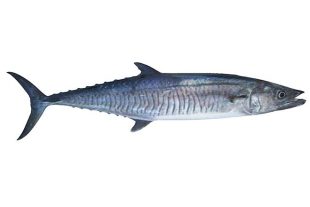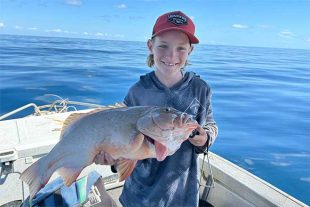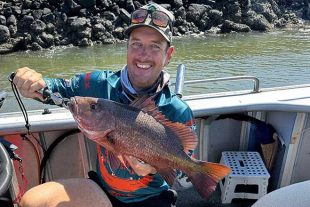| Breathing devices |
Freshwater and tidal water
- Underwater breathing apparatus (other than a snorkel) is not permitted when taking fish by any means.
|
| Canister trap |
Freshwater
- The trap must not exceed 60cm in length or 50cm in width, height or diameter.
- It must open at one end.
- Size of the mesh must be no more than 25mm (if not made of rigid material).
- When the width, height or diameter is measured anywhere along the length of the trap, it must not exceed the diameter of the trap’s opening.
|
| Cast nets |
Tidal water
- Must not exceed 3.7m from the point of rope attachment to the rest of the net, the net lead line or the bottom of the lowest pocket of the net.
- Mesh size should not exceed 28mm.
Cast nets are not permitted in freshwater. |
| Collapsible trap |
Freshwater and tidal water (crab apparatus only)
- The trap should be made of rigid material and have at least one collapsible side.
|
| Crab pots and dillies |
Tidal water
- No more than four pots, dillies or a combination of both may be used per person.
- There must not be more than four pots on a boat per person when on the water.
- You must have an identification tag on your pot bearing the surname and address of the person using the apparatus.
- All crab pots must have a light coloured solid float attached when not tied to a fixed object. The float must not be less than 15cm in any dimension and also identify the user’s name.
- When the pot is tied to a fixed object a tag must be attached to a part of the rope (above the high water mark) that identifies the user’s name.
- A dilly for spanner crab fishing should be made of solid steel with a thickness of at least 6mm and not exceeding 1m in each dimension.
Crab pots are not permitted in freshwater. |
| Dilly nets |
Freshwater
- The net must not have a diameter of more than 125cm and a mesh size of more than 25mm.
|
| Fishing lines |
Freshwater
- No more than six fishing lines should be used alone or combined.
- A set fishing line must not be used.
- A set fishing line must not be used as a cross-line.
- Only one hook, artificial fly, bait jig or lure can be attached to a line.
- You can’t be more than 50m away from any of your fishing lines.
Tidal water
- Up to three fishing lines are permitted consisting of a total of six hooks.
- An artificial fly, lure, bait jig or gang hook is considered equal to one hook.
- A cross line, drum line, free-floating line or set line is not included as a fishing line.
- You must be present with the line at all times.
|
| Funnel traps |
Freshwater
- The maximum funnel trap size is 70cm long and 50cm high or wide.
- The maximum mesh size of funnel traps is 25mm, with up to a maximum of 4 entrances made of rigid material.
- The maximum entrance size is 10cm. The following restrictions apply:
- Funnel traps with a maximum rigid opening size of 5cm in all dimensions can be used in all Queensland fresh waters.
- Funnel traps with a rigid opening size of between 5cm and 10cm can only be used in fresh waters west of a line following the Great Dividing Range and west of the Gore Highway (A39) (PDF, 4.8MB) or in the following impoundments—Atkinsons Dam, Baroon Pocket Dam, Beehive Dam, Bill Gunn Dam (Lake Dyer), Bjelke-Petersen Dam, Boondooma Dam, Borumba Dam, Burdekin Dam (Lake Dalrymple), Callide Dam, Cania Dam, Connolly Dam, Cooby Dam, Coolmunda Dam, Cressbrook Dam, Eungella Dam, Ewen Maddock Dam, Fairbairn Dam, Fred Haigh Dam (Lake Monduran), Glenlyon Dam, Gordonbrook Dam, Hinze Dam, Kinchant Dam, Koombooloomba Dam, Lake Awonga, Lake Gregory, Lake MacDonald, Lenthalls Dam (Lake Lenthall), Leslie Dam, Maroon Dam, Middle Creek Dam, Moogerah Dam, Mount Morgan Big Dam, North Pine Dam, Peter Faust Dam, Ross River Dam, Sideling Creek Dam (Lake Kurwongbah), Somerset Dam, Storm King Dam, Teemburra Dam, Theresa Creek Dam, Tinaroo Dam, Wivenhoe Dam, Wuruma Dam, Wyaralong Dam.Funnel Trap usage map (4.8MB)
|
| Hand pumps |
Tidal water
- To be used on foreshores for collecting yabbies only.
Hand pumps are not permitted in freshwater. |
| Open-top pyramid trap |
Freshwater
- Must have a single, rigid top opening, with a minimum size of 15cm in all its dimensions, parallel to the base of the trap
- Must have a mesh size of no more than 25mm
- Must have a maximum base size of 60cm in length and width
|
| Scoop or dip nets |
Freshwater
- Must not exceed 1m in any dimension.
- Handle should be no longer than 2.5m.
- Mesh size should not exceed 25mm.
Tidal water
- Must not exceed 2m in any dimension.
- Handle should be no longer than 2.5m.
- Mesh size should be at least 25mm.
- You can use a gaff or landing net to secure a line-caught fish.
|
| Number and marking of traps |
Freshwater
- Must not use more than a total of 4 freshwater traps, including a combination of freshwater traps
- A tag must be attached to the trap with the surname and address of the person using the trap.
- A light coloured solid float should be attached to the trap if it is not fixed to a stationery object above water level. The float must feature the user’s surname and be 15cm in each dimension.
|
| Round traps |
Freshwater
- The maximum round trap size is 70cm in diameter and 50cm in height.
- The maximum mesh size of round traps is 25mm, with a maximum of 4 entrances made of rigid material.
- The maximum entrance size is 10cm. The following restrictions apply:
- Round traps with a maximum rigid opening size of 5cm in all dimensions can be used in all Queensland fresh waters.
- Round traps with a rigid opening size between 5cm and 10cm can only be used in fresh waters west of a line following the Great Dividing Range and west of the Gore Highway (A39) or in the following impoundments—Atkinsons Dam, Baroon Pocket Dam, Beehive Dam, Bill Gunn Dam (Lake Dyer), Bjelke-Petersen Dam, Boondooma Dam, Borumba Dam, Burdekin Dam (Lake Dalrymple), Callide Dam, Cania Dam, Connolly Dam, Cooby Dam, Coolmunda Dam, Cressbrook Dam, Eungella Dam, Ewen Maddock Dam, Fairbairn Dam, Fred Haigh Dam (Lake Monduran), Glenlyon Dam, Gordonbrook Dam, Hinze Dam, Kinchant Dam, Koombooloomba Dam, Lake Awonga, Lake Gregory, Lake MacDonald, Lenthalls Dam (Lake Lenthall), Leslie Dam, Maroon Dam, Middle Creek Dam, Moogerah Dam, Mount Morgan Big Dam, North Pine Dam, Peter Faust Dam, Ross River Dam, Sideling Creek Dam (Lake Kurwongbah), Somerset Dam, Storm King Dam, Teemburra Dam, Theresa Creek Dam, Tinaroo Dam, Wivenhoe Dam, Wuruma Dam, Wyaralong Dam.
|
| Seine nets (bait or drag nets) |
Tidal water
- Must not exceed 16m in length and 3m in drop.
- Mesh size should not exceed 28mm.
- The net must not contain a bag, pocket or anything similar.
- It must not be anchored, staked or fixed.
- The net should not be out of the water when containing fish other than to remove and release them.
- All regulated fish not intended to be taken should be released into deep enough water to allow escape.
Seine nets are not permitted in freshwater. |
| Shell dredges |
Tidal water
- Mouth of the dredge must not exceed 60cm across
- Teeth should be no longer than 7.5cm
- Conditions should be checked further in fisheries legislation.
|
| Spearfishing and spear guns (including bows) |
Tidal water (selected locations only)
- A power head is not permitted unless in defence against a shark.
- You are not able to hunt barramundi between 6pm and 6am.
Spear and spear gun apparatus are not permitted in freshwater. |
| Tropical rock lobster fishing gear |
Tidal water
- Free-diving using a mask and snorkel and a rubber-powered spear or spear gun is the only form of breathing and equipment apparatus permitted.
|
| Worm digging fork |
Tidal water
- To be used on foreshores for collecting worms only.
Forks are not permitted in freshwater. |
 Bush ‘n Beach Fishing Magazine Location reports & tips for fishing, boating, camping, kayaking, 4WDing in Queensland and Northern NSW
Bush ‘n Beach Fishing Magazine Location reports & tips for fishing, boating, camping, kayaking, 4WDing in Queensland and Northern NSW

